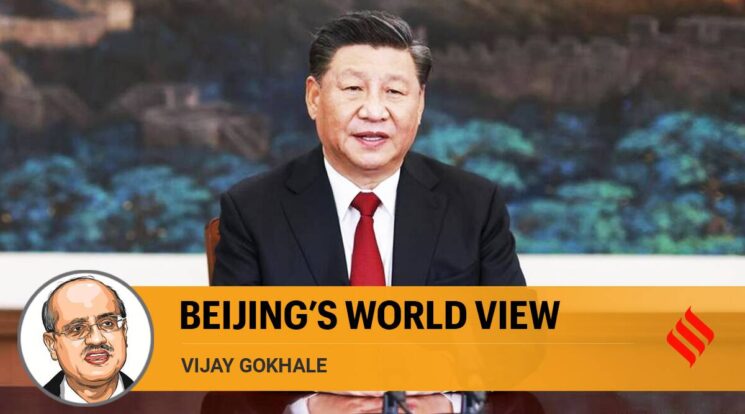Vijay Gokhale writes: China believes its own rise and the decline of the US are inevitable. India must pay attention
Yan Xuetong and Wang Jisi, considered to be two of the high priests of the Chinese foreign policy community, have written recent pieces in the Foreign Affairs. It is no coincidence these were timed to dovetail with Xi Jinping’s speech for the 100th anniversary of the founding of the Chinese Communist Party (CPC), on July 1, 2021. Their task is to interpret for the outside world what Xi Jinping means when he says that “the Chinese people have stood up and the era of suffering bullying has gone, never to return.” Given the elevated status of these two gentlemen, it is well worth reading their pieces in full.
Wang and Yan start by acknowledging that recent changes in US policy mean that relations are unlikely to grow any less tense or competitive. Wang holds America responsible for this adversarial environment. According to him, the US-China relationship has always revolved around two ideas: The idea that the US will respect and not de-stabilise China’s internal order and the idea that the Chinese will not intentionally weaken the US-led international order. This implicit understanding, Wang holds, is now unravelling and the Americans are to blame. Wang wants us to believe that this situation has come to pass because the US is seeking a regime change. China, according to both, is not to blame in any way, and is simply responding to American provocation. Wang’s advice to Washington is to return to the earlier implicit consensus.
Both scholars wish to persuade readers (and nations) that if this is not the case, then unbridled competition can only end one way — badly for America. America is plagued by political dysfunction, socio-economic inequality, ethnic and racial divisions and economic stagnation. Wang, in particular, stretches the argument by describing gun violence and urban unrest in America as “a degree of chaos and violence without parallel in China” and by drawing comparisons between the political chaos of the 2020 presidential election “especially compared with the order and predictability of the Chinese system.” He says that Washington must accept that “CPC enjoys immense popularity among the Chinese people; its grip on power is unshakeable.” The strained effort almost looks like a justification to the Chinese people about the benefits and resilience of the Communist dictatorship.
Yan uses US “ill-intention” towards China to justify the “paradigm shift” to a more assertive foreign policy. For over a decade, China has been attacking American unipolarity and the “Cold-War type alliance”. The new challenge for Beijing is how to be seen to be championing the cause of multipolarity while actually striving for a duopoly with the US or, as Yan cleverly phrases it, “a multipolar order with US-Chinese relations at its core.” To build a justification for these contradictory objectives, Yan advances several arguments. He refers to China’s “dual identity”, claiming that there is no contradiction between China seeking global co-hegemony and, at the same time, continuing to be a “developing country”, as a demonstration of its geo-political alignment. Yan also talks up “inclusive multilateralism”, which is apparently what Beijing’s frenzied efforts at building plurilateral platforms, including in South Asia, are all about. Is this not the “alliance-building” that China accuses America of? Apparently not, because America is engaged in “exclusive multilateralism”. The rather specious argument that Yan makes to differentiate between the two is that China’s coalitions are open and non-threatening but the American ones are “issue-based coalitions in opposition to China.”
In case the rest of the world is still confused about what China might be doing differently from America, Yan helpfully adds that America exports its value system (democracy) as part of its foreign policy, while China does not. According to Yan, that is because China is a developing country with “Chinese characteristics”, which, somehow, implies that its political system and governance model cannot merely be exported to other countries. The argument is unconvincing when President Xi has, on more than one occasion, referred to the Chinese model as an alternative for developing countries who wish to be independent.
Their main message to the Americans is to give up on pressuring China to change its political system as this will be futile, and to return to accommodating the Chinese Communist Party as a legitimate global player. The Chinese message to the rest is to bend to China’s inevitable hegemony. At the conclusion of both essays, readers might be left wondering why China wants to return to the old consensus when China’s rise and American decline are both assured. Is it because they still need a few years more of co-habitation before they have the power to topple America from its global perch? Or, is it the deep sense of vulnerability that the party feels despite the claim that time and momentum are on China’s side? How does one explain the stepped-up campaigns for “political education” among cadres and the restrictions on “politically incorrect” information its citizens can access if, according to Wang, the leadership is immensely popular?
From India’s perspective, three points might deserve attention. First, the statement that there is a paradigm shift in post-Covid Chinese foreign policy. Second, Yan’s forthright statement that Beijing views America’s so-called “issue-based coalitions” (he presumably includes the Quad) as the most serious external threat to its political security and the biggest obstacle to national rejuvenation. Finally, that China is still offering accommodation if Washington just respects Beijing’s internal order and acknowledges China’s regional dominance.
This column first appeared in the print edition on July 19, 2021 under the title ‘Beijing’s world view’. The writer is a former foreign secretary and author of The Long Game: How Chinese Negotiate with India
Written by Vijay Gokhale
The original article can be found @IndianExpress



Leave a Reply